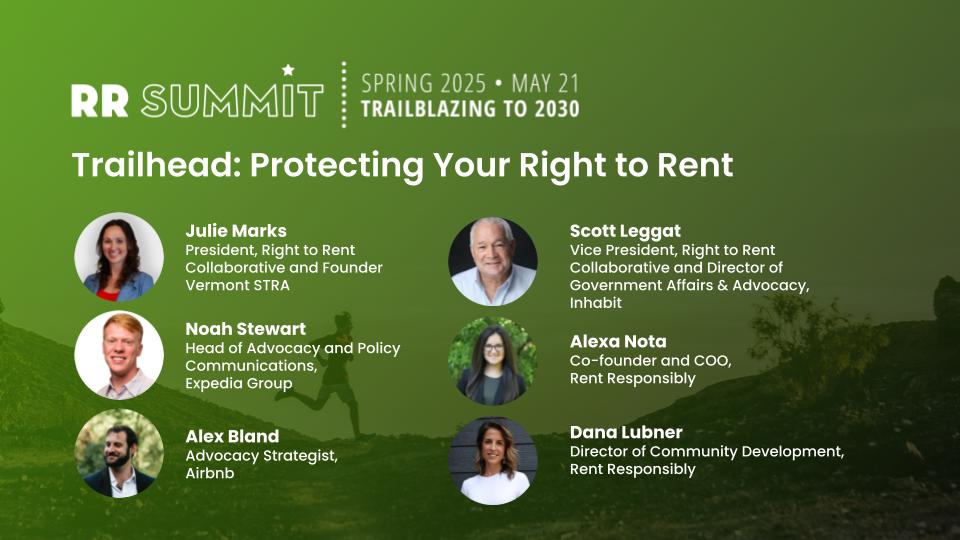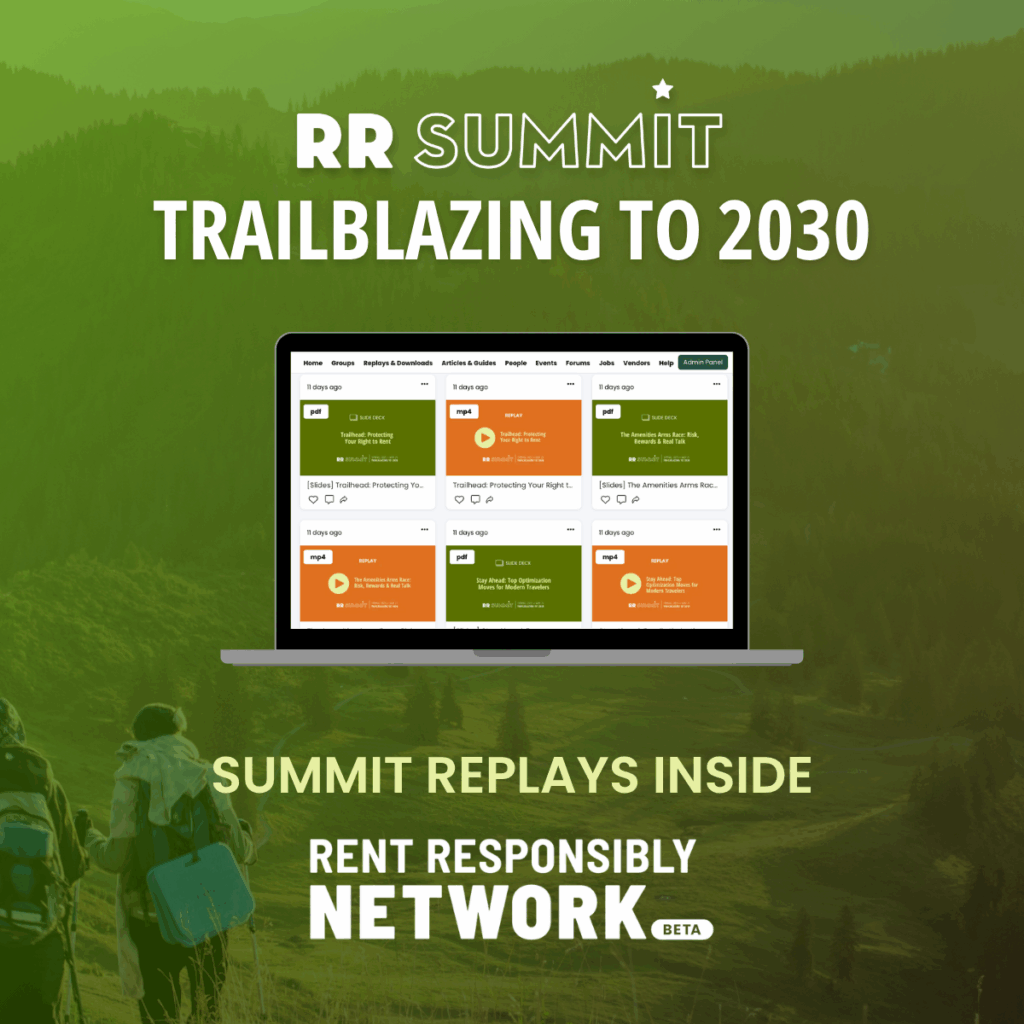Updated on June 12, 2025

During Rent Responsibly’s Spring RR Summit, the Regulations and Advocacy Panel brought together some of the most experienced voices in short-term rental advocacy to unpack the policies shaping the industry. From housing affordability narratives to tax reclassification, the panel provided a wide-angle view of STR policymaking trends and what hosts need to do to stay in business.
To watch the full replay of the panel, visit “RR Summit 2025 Replays and Downloads” in “Replays & Downloads” on the RR Network.
The rules are changing fast for short-term rental operators. In city councils, statehouses, and neighborhood boards across the country, elected officials are drafting legislation limiting where, how, or even if vacation rentals can exist.
“Regulations are only getting steeper,” said Alexa Nota, COO and Co-Founder of Rent Responsibly, during an RR Summit advocacy panel on May 21, 2025. “If they have not come to your area yet, they will.”
That message is clear from the nearly 600 council meetings on STRs held in just 30 days in November 2024. The proposals on the table dealt with zoning, permit caps, taxes and fees, safety standards, nuisance prevention, and, most concerning, bans that would put hosts out of business.

“We are seeing more and more caps on use and limits on ownership in terms of the number of properties a person can own,” said Julie Marks, President of the Right to Rent Collaborative and Founder of the Vermont Short-Term Rental Alliance. “This is all…underpinned by a narrative around housing affordability. But really, what’s most egregious and disturbing…is governments trying to… almost prescribe who they want to own property and how those people are able to use their property.”
Tax talk and budget gaps
For platform leaders like Expedia Group’s Noah Stewart, the pressure is coming from all directions.
“Taxes are really continuing to be a big legislative trend,” he said. States are also considering classifying STRs as commercial to fill budget shortfalls. That can have unintended consequences, like forcing buildings up to commercial code and higher tax rates, he explained.
He has increasingly heard policymakers refer to short-term rentals as a “pressure release valve” for the affordable housing shortage—a strategy that doesn’t yield the desired results.
Airbnb Advocacy Strategist Alex Bland echoed that reality.
“Housing affordability is really one of the biggest issues that every elected official feels like they have to do something about,” he said. “There is this narrative that every unit on one of the platforms should be a long-term rental.” But that’s not how it works; most studies show STRs aren’t a primary factor in housing affordability and availability, he noted.
Read more: Affordable housing vs. STRs: What does the data say?
From villain to voice
This mismatch between perception and data is what drove Dana Lubner into advocacy.
In 2019, City of Denver officials launched an aggressive enforcement action against short-term rentals. Hosts faced accusations of falsifying their primary residence addresses.
“All of a sudden…we were being painted as criminals,” recounted Dana, now Director of Community Development at Rent Responsibly. “We were no longer being looked at as contributors to our local economy, and it was a shock; it felt super personal.”
That same year, Dana co-founded Mile High Hosts and helped launch a statewide coalition in Colorado. Their biggest test was last year’s Senate Bill 33. The legislation aimed to reclassify STRs as commercial properties and would have triggered a 400% property tax hike.
Leaders of the coalition, like Dana, launched an education campaign on the bill’s impact for hosts, policymakers, and constituents. They coached hosts on data storytelling so they could give powerful and persuasive testimony at hearings on the bill, and they organized a Day at the Capitol, during which they flooded the halls to tell their stories.
“We defeated the bill at the very last minute,” she said. “You can’t fight these fights with hope. The hotel lobby holds power because they have both the army and the war chest, and in this fight, we brought both to the table. That’s how we won.”
From reactive to proactive
Being caught off guard is the biggest hurdle to defeating crippling legislative proposals, according to Scott Leggat, Vice President of Right to Rent and Director of Governmental Affairs and Advocacy at Inhabit.
“Typically, we are unprepared when it happens,” he said. “We end up exhausting our efforts and trying to prepare a response when we’re almost too late in the game.”
The solution is to build statewide alliances and get to know policymakers before a crisis hits.
Julie agreed. She advises her members to be visible.
“Make sure your elected officials know you,…what you’re doing, and how you’re doing it,” she said. “We have a long history of being slightly invisible in our communities, and I don’t think that’s served us well.”
Lobbying with purpose
Lobbyists are essential for gathering intelligence on what proposals are afoot and who supports them, Julie said.
“Our local lobbyist is not testifying on our behalf; I do that,” she said. “Our lobbyist is in the hallways every day with his ear to the ground…He’s our first alert system.”
Alex, with Airbnb, added that lobbyists can help alliances craft a strategy for when and how to speak out on proposals.
“Your point is going to be lost if you talk to them too early,” he said. Timing and knowledge of the legislative system are important.
“You need to have somebody who is local and understands that to help guide you,” Alex said.
Deploying the troops
Lobbyists cannot change the tide working alone. Hosts and managers are the most important branch of advocacy, and they need to speak up to make a difference, Alexa said.

“We are quite literally the boots on the ground,” she said.
Plus, “lawmakers really want to hear from constituents,” Noah said. “There’s just a lot more credibility to what you’re saying.”
Dana sees the future in statewide coalitions.
“Together, and it’s going to be more sustainable when we organize our efforts with a statewide, unified voice,” she said. “Local alliances can act alone, but we’re seeing fragmented messaging, duplicated efforts, burnout from leaders, and missed opportunities. And when we come together as a state, we can create that one voice, those shared resources, unified memberships, and everything ends up changing.”
Statewide coalitions have already formed in Arizona, Colorado, Hawaii, Idaho, Michigan, and Vermont.
“In the next one to two years, we’re going to see statewide being the trend in every state across our country,” Dana predicted.
Support Right to Rent
As regulatory proposals increase, so does the need for advocacy. Contributing regularly to Right to Rent, a new nonprofit organization unveiled at the summit, helps to pay for staff, lobbyists, legal fees, and other advocacy essentials that short-term rental alliances need to defend the right to rent.
To watch the full replay of the panel, visit “RR Summit 2025 Replays and Downloads” in “Replays & Downloads” on the RR Network.
…


